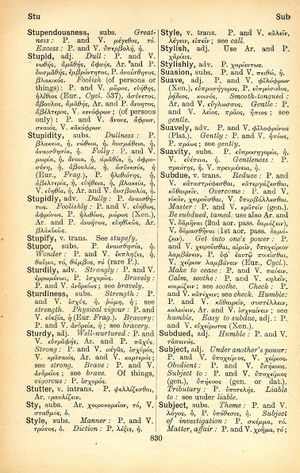suave
οὐ βούλομαι δυσχερὲς εἰπεῖν οὐδὲν ἀρχόμενος τοῦ λόγου, οὗτος δ' ἐκ περιουσίας μου κατηγορεῖ → for me—but I wish to say nothing untoward at the beginning of my speech—whereas he prosecutes me from a position of advantage | but for me—I do not wish to say anything harsh at the beginning of the speech, but he prosecutes me from a position of strength
English > Greek (Woodhouse)
adj.
P. and V. φιλόφρων (Xen.), εὐπροσήγορος, P. εὐπρόσοδος, ῥᾴδιος, κοινός.
Smooth-tongued: Ar. and V. εὔγλωσσος.
Gentle: P. and V. λεῖος, πρᾶος, ἤπιος; see gentle.
Latin > English (Lewis & Short)
suāve: adverb., v. suavis, I.
Latin > French (Gaffiot 2016)
suāvĕ¹⁴ (suavis), n. pris advt, agréablement : Hor. S. 1, 4, 76 ; Virg. B. 3, 63 ; 4, 43.
Latin > German (Georges)
suāve, Adv. (suavis) = suaviter angenehm, lieblich, suave olens, s. suāveolēns: suave rubens, Verg.: suave sonans, Augustin.: suave resonare, Verg.

